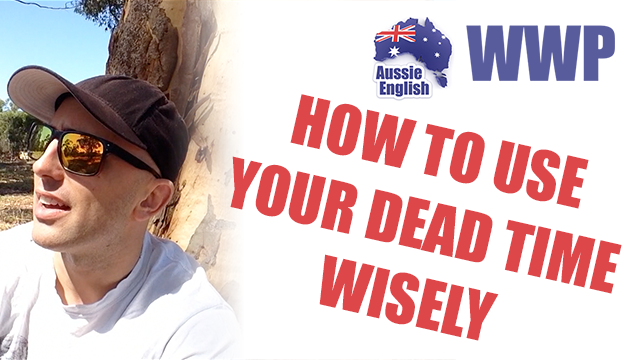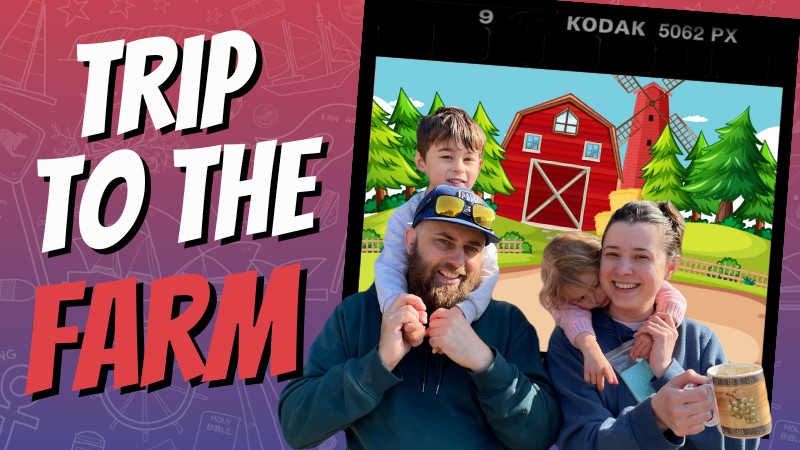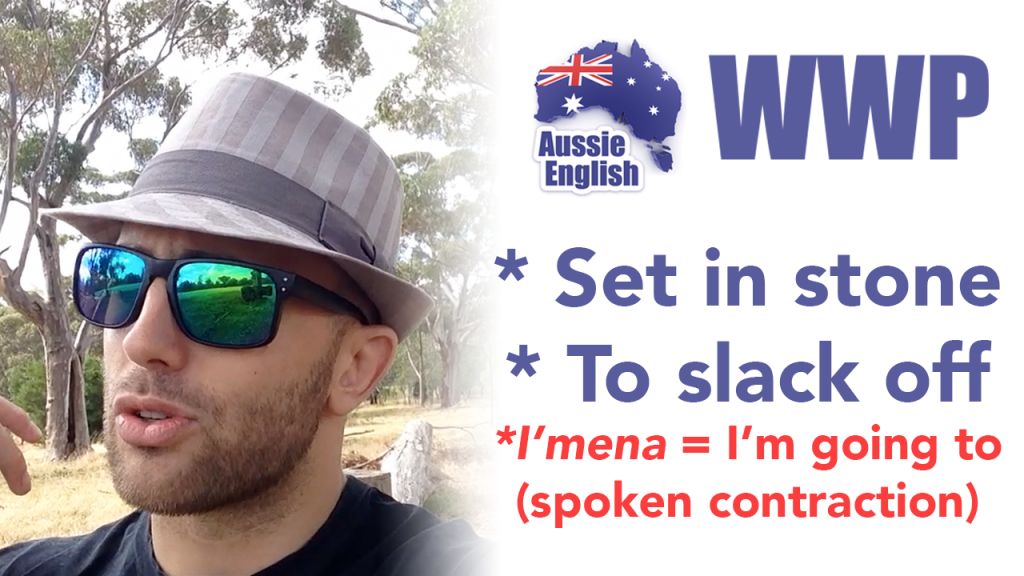
AE 471 – WWP: A Reality Check
Learn Australian English in this Walking With Pete episode of the Aussie English Podcast where I talk about my recent reality check.
AE 471 – WWP: A Reality Check
Man, it’s cold! Cold, cold, cold. How are you guys going? It’s time for another Walking with Pete episode, and I’m just getting in to the car. Just let me get rid of my chewing gum. Turn the car on. Let’s go for a drive.
There’s a few things I want to chat to you about today, though. So hopefully it’s going to be an interesting and thoughtful episode.
Let me reverse up here and not run over the birds behind the car. So, it’s currently sunset-ish. It’s about 430pm in the afternoon and Kel’s have to work late at the embassy, late for her, I guess.
So, normally, she finishes work at like probably 3 o’clock. I think it’s a Brazilian thing where they tend to finish work earlier in the day. And so, everyone leaves the embassy by 3:00, they turn the alarm on, so she has to be out of the building even if she wanted to stay longer and work. So, but, I think there is something like one person has to stay behind every single week for that week in order to make sure that if anyone shows up, there’s someone there to help them. I don’t know what the deal is exactly, but this week it’s her job, apparently, to stay until about 5 o’clock. So, and, I think, by that time, buses and transport, public transport, around here tends to get incredibly busy, and so she’s wanting to come and grab her.
So, I’m doing that, but I thought I would talk to you guys today about what I’ve been up to this week, Portuguese and photography, and a little bit of, you know, the ups and downs of language learning or of, you know, trying to pursue any kind of endeavor that you’re trying to improve at, right? Whether you’re trying to become good photography, at a sport like soccer or tennis or karate, you know, it could be anything. Any time you’re trying to achieve something, there’s always ups and downs. Anytime you’re trying to master something, there’s always ups and downs, and I think it’s… There are lots of parallels between a lot of different hobbies and endeavours that we try and master, and it’s… I’ve noticed a lot of it with photography and language learning specifically at the moment where… a lot of ups and downs. I’ll have nights where at the moment I’m speaking a lot of Portuguese, especially with the housemates, and obviously my fiancée Kel who’s from Brazil. We’re always talking in Portuguese, and it’s funny when you had the same set of people and when you speak English with them you’re the one at the top of the English speaking hierarchy, right? Anytime we’re speaking English, obviously, I’m the only native English speaker. So, I am the best, quote/unquote, best English speaker in that group when we’re chatting in English. But as soon as we switch to Portuguese, the tables turn, and I am now at the very, very bottom of the hierarchy with regards to capability of speaking Portuguese. So, now, you switch from top to bottom on a dime, incredibly quickly. So, we’ll be chatting away in Portuguese. I’m at the bottom. You know, I’m the limiting factor. I’m the one who wants to slow down the conversation, who’s constantly thinking of what I’m trying to say, who can’t think of the correct words, who says things awkwardly, and then as soon as we switch to English, it’s the other way around. I mean, the other guys are a lot better at English than I am Portuguese, but still, they’re the ones if anyone is… who are limiting the conversation.
So, I guess, that was one thing that I’ve noticed that has been really funny is that I’ve had to get used to being the person at the very bottom pretty much all the time, because we’re always speaking in Portuguese. So, that’s been sort of a humbling experience, but it’s been really good too, because it drives me to want to improve. So, that’s something worth talking about.
When you… It’s the same thing I noticed in jiujitsu and in a lot of other endeavors that I’ve tried to sort of master over the years. It’s so much better when you don’t get comfortable with being at the top of the hierarchy. Right? So, of a hierarchy of competency in whatever it is that you’re trying to become competent at: karate, jujitsu, soccer. It’s always good to try and surround yourself with people who better than you at that thing, because it pushes you to want to be better yourself. And so, I really, really like the fact that with my Portuguese I’m not… I’m not surrounded by people who are as good as me or worse than me. I’m surrounded by people who are native speakers. And so, I’m constantly trying to work my butt off and really hard to be able to, you know, get closer to where their level is with regards to Portuguese. and I think it’s also really important too, when you think about this in terms of people that you spend time with, if you want to be a really productive person and you have a lot of projects and things that you’re working on, and you want to get a lot out of life, it’s always really good to think about the people you spend time with, because, I can’t remember where I first heard it or who came up with this or, you know, where it originated from, but I’ve heard quite a few times in a few different places that you are the average of the five closest people in your life. So, the five people that you spend most time with are going to have a huge impact on the person that you become, right? So, if you spend your time all day hanging out with people who, say, dropkicks, they don’t work, they do drugs, they’re very lazy, they don’t work hard on anything, even though they don’t work, you know, whether it’s a hobby or… they don’t pursue self-improvement, they are they don’t pursue curiosity, you’re not going to feel driven to do those things, you know? Whether or not you would under other circumstances want to do that, if you’re spending the majority of your time with people who aren’t interested in pursuing excellence in some sort of area, who aren’t interested in pursuing that curiosity, who aren’t interested in learning, who aren’t interested in being motivated and following a discipline, you’re going to end up ultimately diminishing your abilities or the possibilities that you would have it being someone you could potentially be.
Whereas, if you spend your time surrounded by people who are constantly working hard, who are constantly driven, constantly motivated, always looking to improve, always looking to develop themselves, then as a result, whether or not you like it, you’re going to be a better version of you as well because of the effect that those people will have on you, you know?
Like, if you go to a party and everyone’s drinking it’s hard to not also drink, right? You don’t want to be the person who sticks out and doesn’t do what everyone else does. And the same thing goes for, say, if all of your mates want to go to the gym, it’s hard to be the one guy who says, nah, I don’t feel like working out, because you suddenly feel guilty, right? You feel like a loser. You want to do what everyone else is doing.
And so, that I’ve noticed too happens with pretty much anything. If you want to be…. if you want to be someone who achieves a lot of things, surround yourself with other people who achieve a lot of things, and it may be brutal at times, especially if you have family members or friends that are sort of diminishing your capabilities, but you kind of have to think about what it is that you want, you know, and if… you know, I’ve had to do that a few times that I’ve had to cut off a few friends. Anyway, I’m getting side tracked.
But I’ve noticed that with Kel, at least recently, my fiancée. She is always working hard now, because she’s always seeing me work really hard. I mean, and that’s not to say she wasn’t working hard beforehand, but I feel like it’s good that she gets motivated when I’m motivated to study or to do something, and she’ll see me doing it and she’ll be like, oh, damn! I need to go and work on something whether it’s watching a video on YouTube about how to do photography or whether it’s studying more English or reading an English book and then asking me questions about it when she sees me learning Portuguese. I love the fact that she feeds off my passion, and as a result, when I see her working hard it, makes me feed off her passion and her determination and her discipline. And so, yeah, I’ve noticed that a lot recently where both of us… who knows who started, who was the first person to kind of do something in front of the other person that got this whole process kick started, but I’ve definitely noticed that recently that all the people I’m surrounding myself with at the moment are driving me to want to be a better version of myself and work harder.
Anyway, that was sort of a tangent, I guess. It’s sort of related to languages, but that’s what I’ve been up to with Portuguese recently. I’ve really been working on it a lot and I’ve noticed some really big… some really big improvements, mainly in fluency. I haven’t really noticed my vocabulary developing a whole lot, although, I hope it has been, and I guess, that’s something else worth talking about.
I noticed that with photography, though, recently as well, I’ve been going to the same place repeatedly, probably every day, every second day, maybe four times a week at the moment. I’m going to this reserve nearby and there is… it’s pretty big, there’s a lot of kangaroos, echidnas, wallabies, all kinds of animals. We took some really good photos of some scorpions and some frogs the other day, which was really cool.
But, I’m going there a lot and taking a lot of photos, and it gets harder, because you keep going to the same place so it gets harder and harder to come up with ideas about what to take photos of, specifically if you’re trying to take photos of the same thing, right? If I’m taking photos of kangaroos all the time, it gets harder and harder to come up with ideas. But as a result, it forces me to try and… to try and come up with new ideas and to try and improve what I’m already doing. And the same thing with landscape. The landscape doesn’t change, but the way you see it and the angles that you get and the… you kind of get forced to really try and improve how you’re taking photos when you have to take the photos are the same things all the time. I think that really applies to languages as well, right? If you coming to talk about the same things all the time, you’re going to develop pretty quickly. You don’t want to just be constantly changing what you’re confronting, because then you don’t really dig down deep and you have to improve at a specific set of skills within that thing that you’re trying to improve, right?
If you constantly have to talk about the same stuff in English you’re going to get really good at talking about that stuff compared with if you are constantly talking about something new all the time. Although, both things have a place, right. You don’t want to get too bored that you don’t want to take photos of something or you don’t get to speak in English, but you also want to change it up a bit so that you have fun and you also want to practice those things.
But I noticed that with photography. I’ve taken a lot of photos recently and I kept thinking, they’re all crap, they’re horrible, I’m not doing very well. But then I would get home and Kel would sit down next to me and we’d be going through these photos sorting out the ones that I’ve taken, and you see them again in a different light, and you’re like, some of these are actually good, and some of these are better than they were that are… compared to the ones that I took last time, and you start noticing improvement when you get that… a chance to kind of look at the photos you’re taking.
And I think it’s the same with language. I’ve noticed that with Portuguese at least. I’m constantly feeling like I’m not speaking very well. And I think we get stuck like that, because, we get… we’re a bit negative, right? Humans tend to be pretty negative where they’re focused on what they’re doing wrong more so than the things that they’re doing right. You know? It’s pretty rare for you to give yourself a pat on the back for something you did right, but it’s pretty common that we chastise ourselves, that we are hard on ourselves, that we are nasty to ourselves when we don’t get things 100 percent right.
And so, that happened in photography photography recently, where I had been taking a lot of photos and at the time I may feel really disappointed with my results, a little disenfranchised, like I’m useless, like I’m hopeless, but then later on when I get to sort of sit down and analyse things, I’ll see, okay, I’m actually improving. I can sort of tell that some of these photos are a lot better than they were a month ago or a week ago.
And it’s the same with Portuguese. I’ve noticed that I keep feeling like I’m not doing very well and that the conversation sticks, and then I’ll chat to Kel about that, and she’ll say later that night, well, Pete, you spoke for five hours today in the car whilst we drove, you know, down to the beach and you talked about all of these complex issues. You weren’t perfect, but you couldn’t do that a month ago, you couldn’t do that two months ago. And so, it’s nice to have a reality check. And I guess, that’s the thing at the end of the day, a reality check. Maybe that will be the theme of this episode.
It’s good to have a reality check sometimes and just have someone else step in and be able to tell you that you’re doing the right thing, that you’re improving, you’re doing well, but also yourself be able to step back and not criticise yourself too harshly and give yourself a break and have a reality check and say, you know, I may not be where I want to be, which hopefully, you’ll never be there, right? You want to constantly be improving and constantly aiming to be better at who you are or what you can do right now, but you don’t want to get into a pattern of being hard on yourself all the time, right? You don’t want to always be 100 percent whip and no carrot, right?
If you’re the person who is trying to reward a horse who’s pulling a cart you’ve got… You can either feed the horse and try and get the cart to move or you can try beating the horse to get the cart to move, right? So, you can use positive feedback, which would be giving them the carrot positive incentive, or you can use negative feedback, which would be beating them with a whip and giving them a, you know, negative incentive to get moving.
You have to try and become the kind of person who gives yourself more positive feedback, hopefully, mostly, if not completely, positive feedback all the time than negative feedback. And this is something that I have to try and develop in myself constantly and remind myself when I’m feeling very self-critical and down on myself and I’m not seeing the results that I expect of myself, I have to remind myself to be nicer to who I am to be nice… because we’re the voice in our head, right?
We are the person we have to spend all of our time with, the voice in our head, and you don’t want to spend all your time with someone who is horrible, right? You don’t want to spend time with someone who hates you, who treats you horribly, and I had to… I was chatting to cal about this recently, she was constantly berating herself and being down low self and critical of her own photography and her own English, and I was saying, would you say this to me if I came to you and said, my photography sucks! I hate my photos! I’m horrible! I can’t take photos at all! Or, I hate my Portuguese! I’m horrible! I can’t speak Portuguese at all! Would you say to me the same things that you’re currently saying to yourself or about yourself? And she said, no! I would never say that. I would never say that you were horrible. And then I said to her, well, why would you say to yourself? If you wouldn’t say that kind of stuff to your best friend, to your fiancé, to your husband, to your parents, to your children, why would you say to yourself? Why would you say to yourself?
So, that was something I got out of a book recently called 12 Rules For Life by Jordan Peterson. And I can’t remember, which rule that was, but one of them was treat yourself like you’re your best friend. At least, I think that’s what one of them was. It was, like, treat yourself like you’re someone that you’re friends with. Don’t be so hard on yourself. Be nice to yourself. Find reasons to say positive things about yourself, because I think we constantly get stuck in a sort of cycle of negative feedback to ourselves, like, we know what we could be and we’re not there yet and we get disappointed, but we definitely need to spend more time being kind to ourselves.
Anyway, guys, I’ve been ranting for a while now. I covered a few different topics in there. I hope you get something out of it. It’s of cathartic and nice for me to just be able to talk about these issues and my own, you know… things that are going on in my head, my own problems, the kinds of things that I’m trying to work through, especially, with trying to improve at these endeavors. My personal endeavors of trying to improve my languages, trying to improve my teaching on English, trying to improve my photography skills, my relationships with people.
And so, I guess, I would love for you to leave this podcast episode thinking about, how do you treat yourself? Do you treat yourself like someone you’re friends with or do you treat yourself like someone you don’t really like, that, you know, are you horrible to yourself at times?
So, with that guys, I hope you have an amazing day and I’ll chat to you soon. All the best.
Here's what you get when you sign up!
- Read while you listen using the Premium Podcast player.
- Understand every word in every episode.
- Download all PDF transcripts and MP3s for 600+ episodes.
- Get access to bonus member-only episodes.












Responses